In my experience, the best crypto storage options offer both software and hardware based wallets as a way to ensure security and ease of use. Hardware wallets offer by far the safest and most secure storage methods while software wallets are considerably easier to use.

Regrettably, most brands hesitate to provide both functionality to their users — except for Exodus, which stands out with its core mission of simplifying cryptocurrency storage, transfers, and exchanges for everyone. They provide wallets that allow cryptocurrency holders to take part in decentralized financing, even without any deep knowledge about how blockchains work.
Having said that, is Exodus truly the best option for storing and transferring cryptocurrencies in 2024? Well, there’s only one way to find out: By comprehensively reviewing all of the features the wallet has to offer.
Core Features of Exodus Wallet
From what I’ve explored of the wallet, the features below are what allow Exodus to stand out from other crypto wallets.
Non-Custodial Storage
In my opinion, Exodus has the potential to be one of the best crypto wallets for individuals that prefer non-custodial storage. Mainly because it allows users full control of their own cryptocurrencies.
Users are allowed to retain control of their own private keys for their cryptocurrencies when setting up their wallets for the first time. These private keys are backed up by a 12, 18 or 24 word passphrase.
More importantly, Exodus doesn’t require access to any of your wallet credentials, thereby ensuring that you can store cryptocurrencies away from centralized parties.
User-Friendly Interface and Design
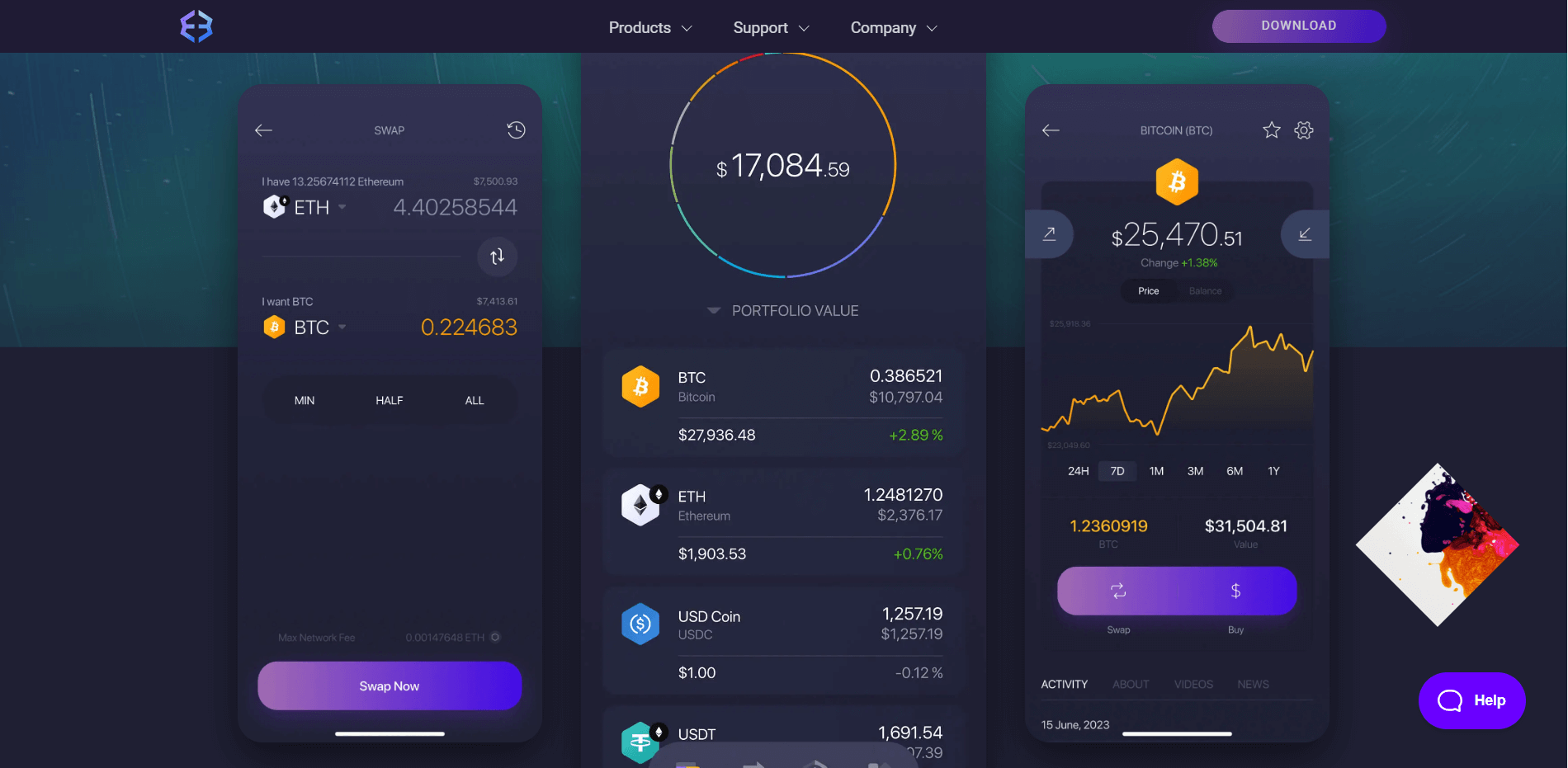
Exodus takes great pride in being able to streamline the crypto storage and transfer process for crypto users that aren’t blockchain geeks. This is evident in the user-friendly design of its wallet. In fact, at first glance I was quite impressed with how clean and organized the wallet’s user interface looked.
The main dashboard in particular expertly displays a user’s portfolio of their moon landing holdings, making it easy to differentiate between the current cryptocurrency he/she is holding. The dashboard also displays each asset’s current market price along with other real time market details.
Support For Multiple Cryptocurrencies
I've been using Exodus for a while now, and I must say, it's been a game-changer for managing my crypto assets. One scenario that truly highlights its value is when I needed to diversify my portfolio across multiple blockchain networks and cryptocurrencies.
With Exodus, I seamlessly added a variety of tokens from different networks like Bitcoin, Ethereum, Cardano and Polygon. What's even better is that it supports over 260 cryptocurrencies, so I could explore a wide range of investment options.
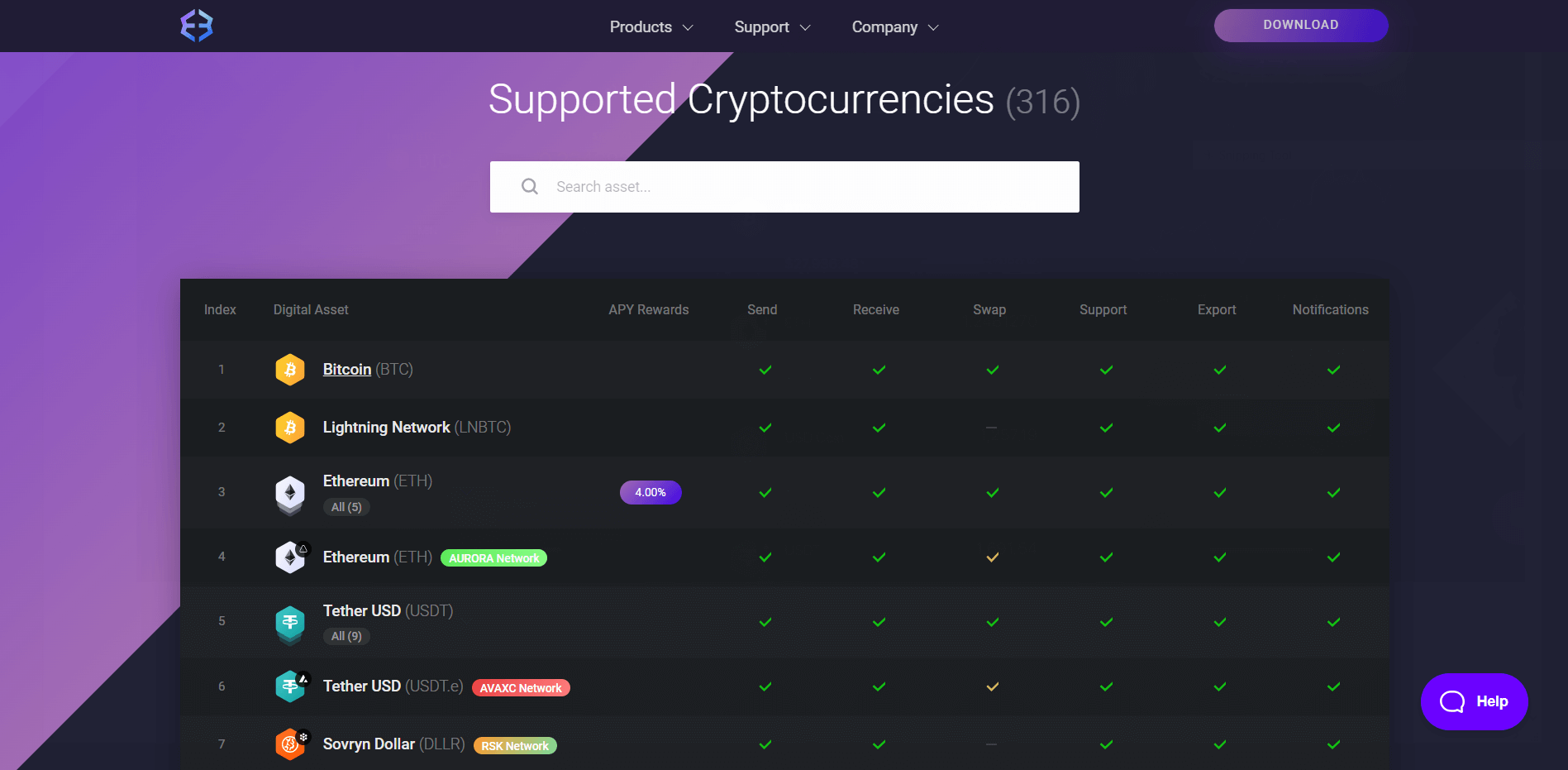
One of the standout features is the built-in crypto transfer function. I needed to send some crypto to a friend, and Exodus made it incredibly simple. There were no additional fees apart from the standard GAS fees, which I appreciated.
The versatility of Exodus is another plus. Whether I'm on a Windows PC, Mac, or Linux, I can access it through the desktop software. When I'm on the go, the mobile app is handy for both iOS and Android. Plus, for added convenience, there are extensions for Chrome and Brave browsers. It's this flexibility that has made Exodus my go-to wallet for managing my crypto assets.
Security Measures
What makes Exodus one of the top crypto wallets right now is their attention to detail when it comes to securing their users’ wallets. With that said, let’s take a look at some of the security measures the wallet employs.
Private Key Storage and Encryption
Exodus's commitment to self-custody and customer key autonomy has been a significant reassurance for me in terms of the security of my crypto holdings. It's one of the reasons why I consider Exodus one of the safest cryptocurrency wallets available.
When I initially set up my wallet, the process involved creating a backup of my private key using a 12, 18, or 24-word passkey. Knowing that this crucial piece of information is encrypted and stored only on my device adds an extra layer of security.
What impressed me even more is that Exodus actively encourages users to report any company member who requests access to their private key. This level of dedication to customer key autonomy underscores their commitment to safeguarding our assets, making me feel confident that my crypto is in safe hands with Exodus.
Manual Auditing and Expert Security Staff
Exodus is actively partnering with HackerOne. This partnership allows Exodus to have 10 HackerOne researchers on staff to flush out any intruders in their system and keep their customers’ cryptocurrency data safe.
These researchers are part of dedicated teams that focus on attacker simulation, cloud security and application security. They’re also constantly working to adopt and improve leading security frameworks for the wallet. The company has also put out an active bug bounty in collaboration with HackerOne to anyone who can point out bugs in their apps’ code.
Moreover, Exodus also believes in having a dedicated manual auditing process along with secure tooling and automation to ensure their customers’ assets are safe.
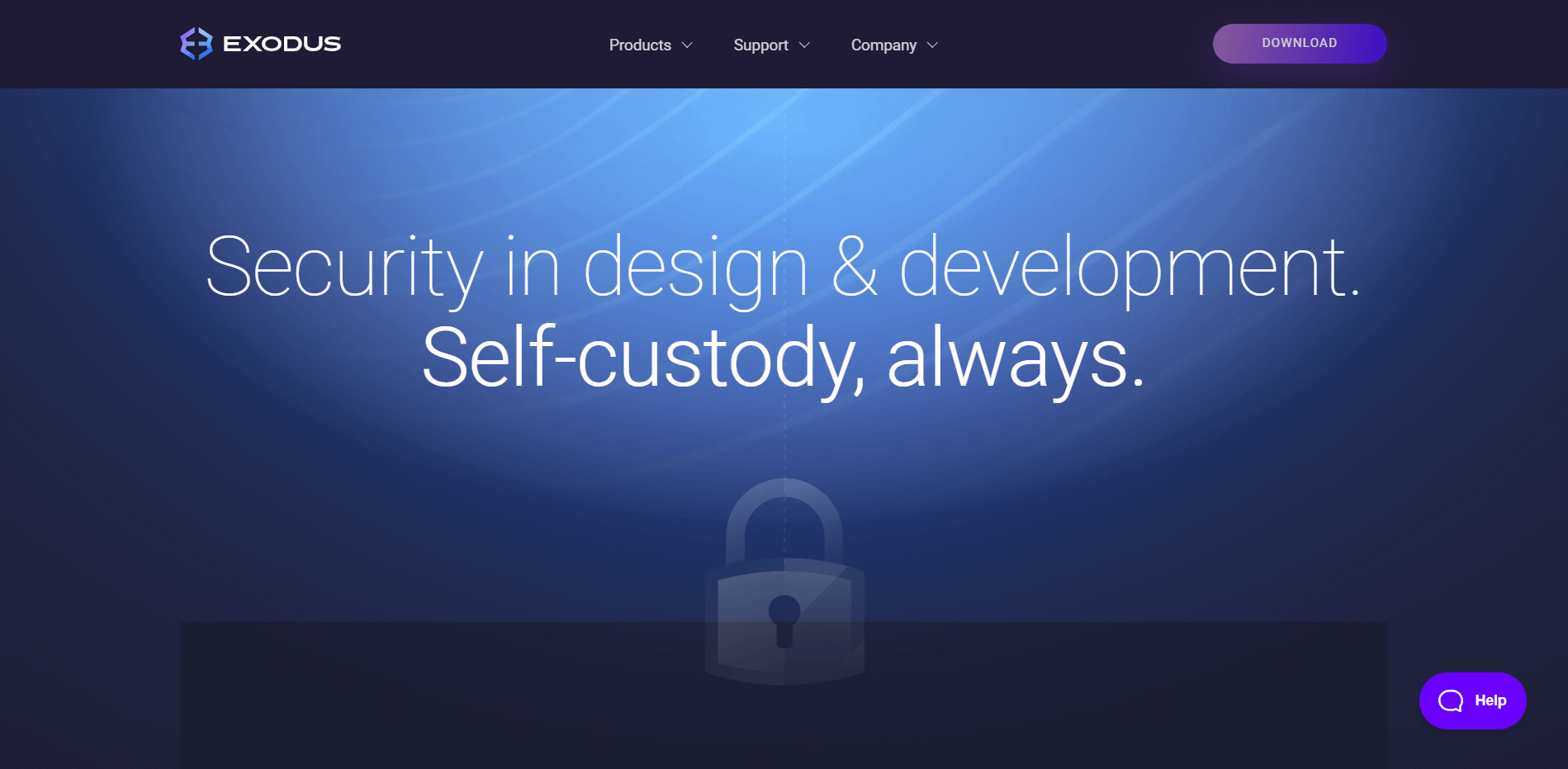
Resolutions for Past Security Incidents
On January 20th, 2023, Exodus wallet reported that a number of their users had their funds stolen due to a breach in their security system. Hackers were able to acquire access to some users’ wallets through a vulnerability in the wallet’s software. Specifically, this vulnerability allowed hackers to gain access to users’ private keys which were used to access their respective cryptocurrencies.
Since then Exodus Movement Inc, the company behind Exodus has stated that they fixed the vulnerability and have implemented new security measures through their partnership with HackerOne to make users’ wallets secure once again.
Exodus Wallet Fees
Exodus itself does not charge any fees or markup for customers transferring cryptocurrencies. However, I think it's worth mentioning that almost all blockchain networks charge a transaction fee of their own (known as GAS fees) when a transfer is initiated.
This fee can vary according to the blockchain network you're transferring over. Exodus prides itself on not keeping any of this transaction fee, ensuring that a 100% of the fees goes to the network. For instance, if you’re transferring over the Bitcoin network, all Bitcoin fees go to the miners on that network.
This is a big change from how other wallets charge their customers on the transfer of cryptocurrencies, as most of them charge a markup in addition to the GAS fees of the network.
Exodus also connects to d’Apps and supports fiat currency purchases, facilitated through RAMP. These transactions for Exodus users will cost customers 4.5%-5% extra when using a debit card.
Pros and Cons of Using Exodus Wallet
According to the information I’ve gathered on the Exodus wallet, I’ve come up with some pros and cons customers can expect when using the wallet for the storage and transfer for their cryptocurrency.
Pros and Cons
- Exodus is one of the few companies offering non-custodial wallets to their customers, currently.
- Supports 50+ blockchain networks and over 260 cryptocurrencies.
- Allows customers to add custom tokens to any supported network.
- Charges no extra markups or fees on the transfer of cryptocurrencies.
- Allows customers to connect to dApps and purchase fiat currencies.
- Extremely clean and sleek user interface allows individuals who aren’t familiar with blockchain technology to navigate the wallet efficiently.
- Have previously suffered from a security breach that allowed hackers to get into customers’ assets.
- Exodus’ partnership with RAMP means that customers will have to pay an extra 4.5-5% on debit card payments.
Integration and Compatibility
As a longtime cryptocurrency holder myself, I understand that what separates the best crypto wallets from the great ones is their integration and compatibility capabilities.
Thus, in this section I’ll be discussing some of the collaborations Exodus wallet has maintained along with how it integrates into different platforms and tokens.
Compatibility with Trezor Hardware Wallets
I previously mentioned how Exodus wallet now also offers hardware wallets in addition to their standard software wallets. Well, this is a fairly recent development caused by Exodus’ partnership with Trezor, a known supplier of crypto hardware wallets.
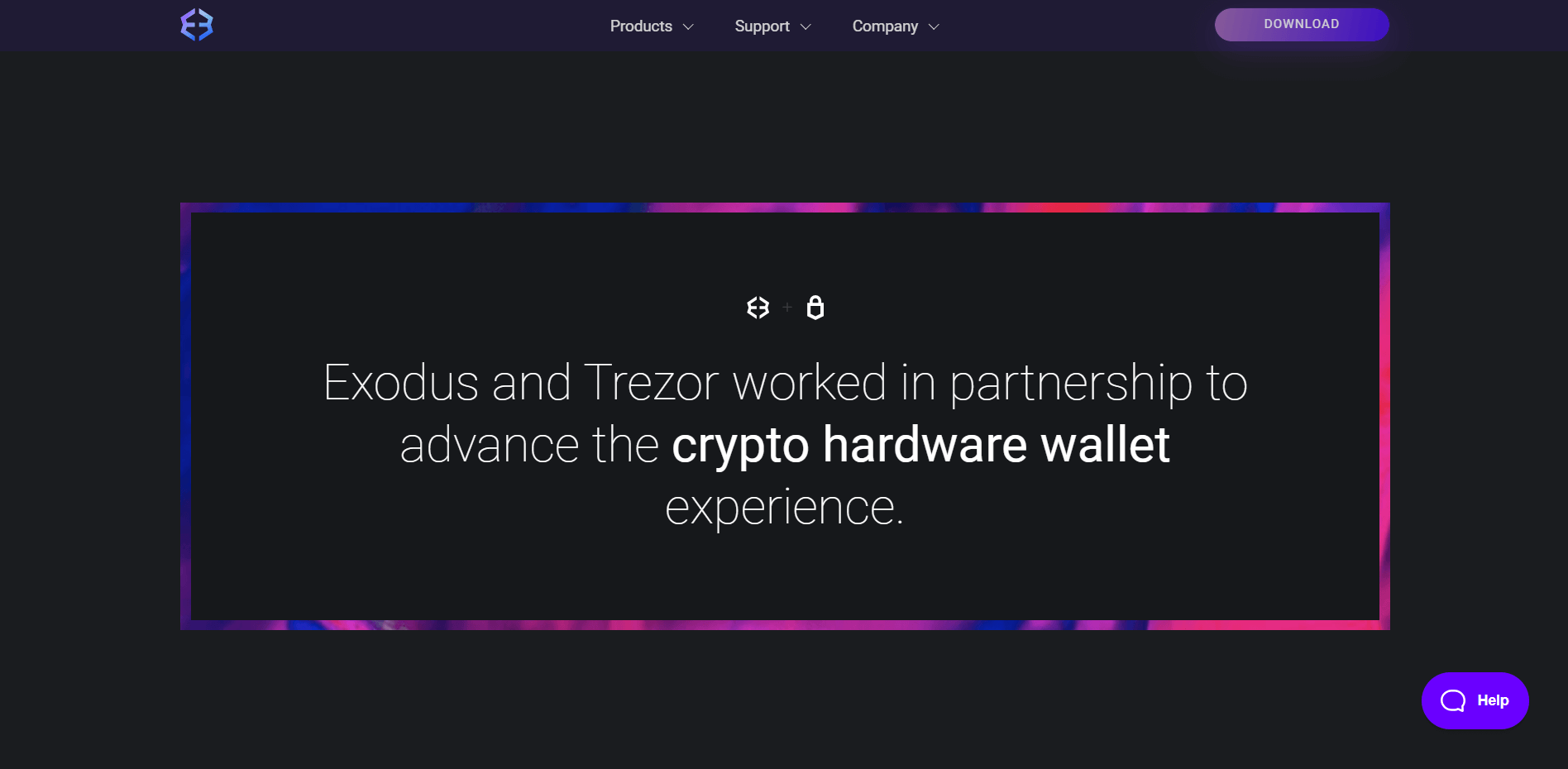
This essentially allows their customers to keep their cryptocurrencies offline and close to their person. A measure that not only enhances the security of their wallets but also allows customers to keep tabs on their portfolios.
Integration with Platforms and Tokens
The ever-expanding list of supported cryptocurrencies in Exodus has truly impressed me. With over 260 assets currently available and the promise of potentially adding 50 more by year-end, it's evident they're dedicated to staying ahead in the crypto space.
When I want to explore this extensive selection, I find it convenient to use the search bar in both the mobile and desktop apps. Plus, the ability to add custom tokens, as long as the respective blockchain network is supported, gives me even more flexibility in managing my crypto assets.
One standout feature is the integrated decentralized cryptocurrency exchange, which allows me to swap over 250 cryptocurrencies right from the wallet interface. What sets this apart from centralized exchanges is the control I have over my crypto. I decide if, when, and how much of it enters the custody of a third-party exchange API provider, ensuring I maintain autonomy over my assets. This control and convenience make Exodus a top choice for managing my crypto portfolio.
User Experience and Usability
Exodus offers an interactive, superb experience for investors of all experience levels, especially beginners. The wallet’s user interface is incredibly user-friendly with all account features clearly displayed. Making the storage, trading and buying of cryptocurrencies absolutely seamless.
Even setting up a new wallet is quite a simple process. In fact, let’s take this chance to look at how you can set up your own account and wallet on Exodus
Walking you Through the Process of Creating an Account
Depending on which device you’re using, your first step will be downloading the Exodus wallet app from your device’s store. Next, you need to open Exodus wallet and select the “create new wallet” button.
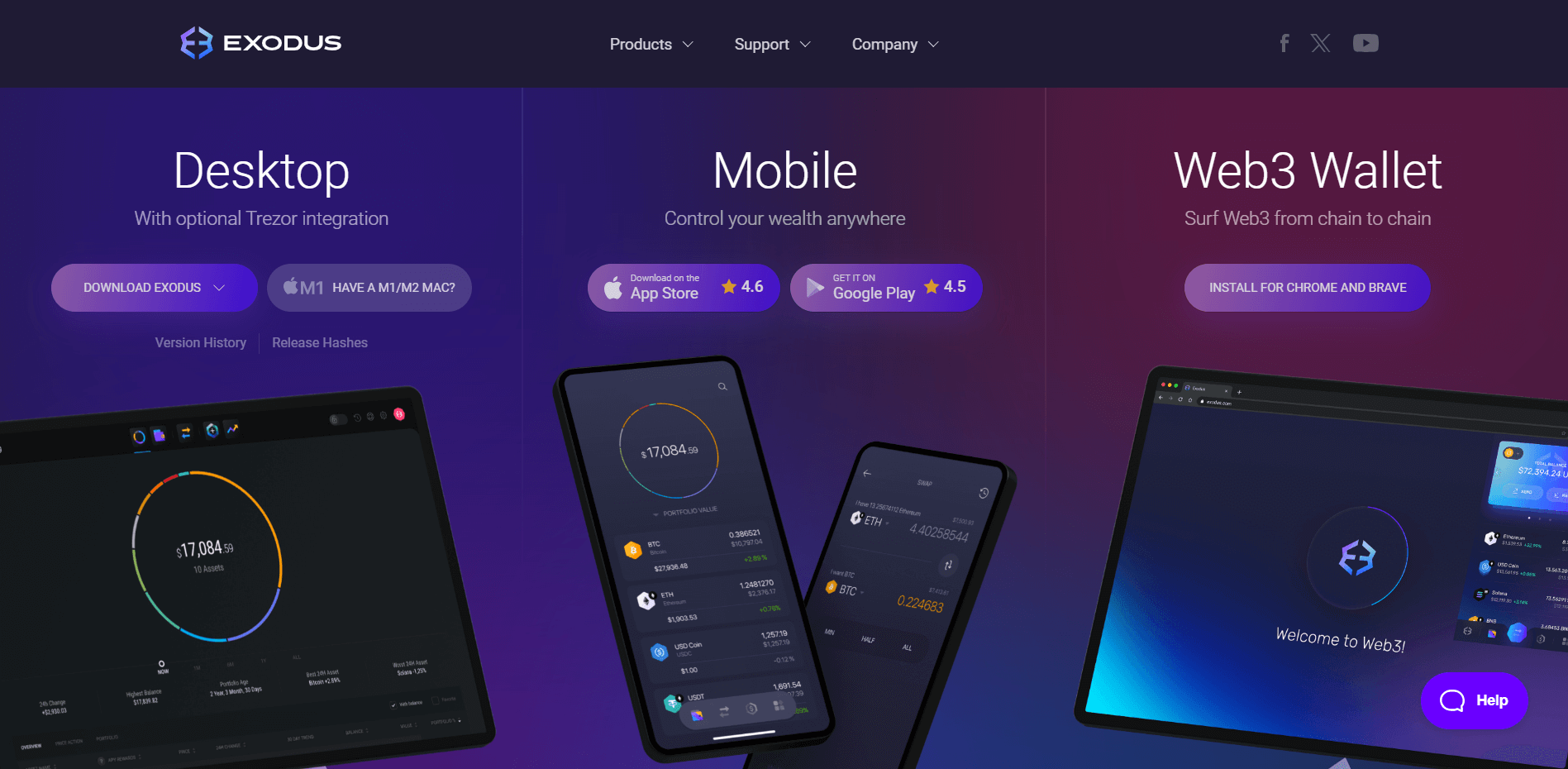
At this point you’re going to have to click on the “backup” button to receive your passphrase. Click on the “reveal” button next and it’ll show you your 12, 18 or 24-word passphrase. Write this phrase down on a piece of paper. Take my advice, do not save the phrase digitally as that can make you vulnerable to hacks. After you click the “confirm” button, Exodus will provide you with the option of setting up a password. I highly recommend opting for this option as it adds an extra layer of security for your wallet.
Now that your wallet is set up and secured, it's time to buy some cryptocurrencies. For this you’ll have to click on the “buy” button first and then choose the fiat currency you’re going to use to pay, like USD or EUR.
After that, just select the cryptocurrency you want to buy, such as Ethereum or Litecoin. The system will then redirect you to RAMP, Exodus’s third party payment gateway. After the purchase is complete, all cryptocurrencies purchased will be added to your wallet.
Using the Wallet
When I added cryptocurrencies to my wallet, I was immediately directed to the portfolio page, and I must say, it's a real game-changer for tracking the performance of my investments. The charts and graphs provided offer a visual representation of how my portfolio is doing, and I can also check the current market values of my assets, including popular cryptocurrencies.
Navigating within Exodus is incredibly user-friendly. If I want to access my wallets, I simply click on the "wallet" icon located at the top navbar. From there, I can seamlessly send and receive a wide range of cryptocurrencies, including Ethereum, Bitcoin, and even Dogecoin. It's this ease of use and comprehensive functionality that makes Exodus my go-to choice for managing my crypto assets.
Support and Community
For me, one of the defining traits of any business is the customer support they offer. Particularly, the responsiveness of their customer support. Fortunately, Exodus seems to excel in that respect as well. Let’s find out how.
Live Chat Customer Support
Exodus provides 24/7 support through the live chat option on its app. This is quite an appealing feature for beginners who often require live assistance. Waiting times can vary depending on how busy the support team is. However, from my own personal experience I can tell you that it shouldn’t take more than 5 minutes for their support team to respond.
Here’s what Investopedia, one of the most well known reviewers of crypto wallets, had to say about Exodus’ customer support:
“With its simplicity, this wallet is great for beginners just getting into the crypto space. It also has great support, which is an essential feature for beginners getting into what many would consider a confusing market”.
Comparison With Other Crypto Wallets
Availability: Exodus offers versatile accessibility, available not only as a mobile app but also as desktop software and browser extensions. This flexibility caters to a wide range of users, including those who prefer using crypto wallets on different devices.
Cryptocurrency Support: Exodus boasts an extensive range of supported cryptocurrencies and blockchain networks, surpassing the others in terms of diversity. This ensures that users have more options for managing their crypto assets within a single wallet.
User-Friendly UI: Exodus stands out with its user-friendly interface, featuring informative graphs and charts for portfolio management. This approach simplifies the user experience, making it more intuitive and visually engaging compared to other wallets.
Suitability for Beginners: While all four wallets are suitable for beginners, Exodus shines by being explicitly recommended for newcomers to the crypto world. Its combination of features and usability makes it an excellent choice for those starting their crypto journey, offering an inviting and accessible platform.
In summary, Exodus not only matches the top wallets in key aspects but also surpasses them in cryptocurrency support and user-friendly design, making it a strong contender among the top crypto wallets.
Conclusion
In summary, Exodus certainly has the potential to be considered one of the top crypto wallets currently, especially considering how its still being regularly updated every two weeks. The wallet offers a user-friendly way to store, manage and buy cryptocurrencies. It also supports a wide range of crypto networks and doesn’t charge any GAS markups or storage fees.
That said, it does fall slightly short of the type of security expected from top level crypto wallets. Any wallet created isn’t immediately password protected, as users have to switch this feature on. Moreover, Exodus always stays online, making it vulnerable to attacks from hackers.
Overall, I’d rank Exodus among some of the best crypto wallets. All it needs is a bit more upgrades to the security flow and it’ll have the potential to be the best.

